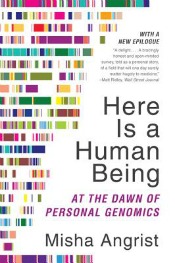Title: Here Is a Human Being: At the Dawn of Personal Genomics
Author: Misha Angrist
Genre: Nonfiction
Year: 2010 (Paperback 2011)
Acquired: From the publisher for review consideration
Rating: 




Review: In 2007, Misha Angrist agreed to make his innermost secrets public for the world to see. As participant number four in the Personal Genome Project, Angrist agreed to let his entire genome be sequenced and then made available to researchers looking for samples to test in genetics research. While most medical research tries to work with anonymous samples, the Personal Genome Project required participants to be public because research into our genes works best when researchers can compare whats in our DNA to how that blueprint is expressed. In a very real way, Angrist and the other participants agreed to bare it all in the name of science.
In Here Is a Human Being, Angrist chronicles his experience being a part of this groundbreaking project. As a participant and observer, Angrist comes at the entire world of personal genomics with a unique and engaging perspective. And if there’s one thing the book makes absolutely clear, it’s that our genome can tell an awful lot about us while simultaneously telling us nothing useful at all.
Here Is a Human Being does what many of my favorite science books are able to do — take the reader inside science to see how the whole process of innovation and discovery works. The path to sequence the human genome, like the path towards many lofty scientific goals, has not been straightforward or without setbacks, and Here Is a Human Being does a good job getting behind the big news to show the people and their process.
The book also does an admirable job explaining the implications of personal genomics for the average person: What would knowing your genome mean? How useful would it be? What risks does sharing your genome publicly come with? I liked that Angrist was open with his own misgivings and concerns about making his genome public, as well as how he came to the decision to participate.
Here Is a Human Being doesn’t have the sort of victorious ending that many books about medical discoveries have. There’s no big reveal when Angrist finally sees his genome, no major mutation that somehow changes his life or incredible scientific breakthrough that moves the process of genome sequencing forward.
Instead, the book is a sort of chronicle of the moment, a look at how far the process of person genomics has come and an acknowledgement of how much there is that we still don’t know. The book is a personal and engaging look at what the future of genome sequencing could be and piqued my interest in what is to come.
Other Reviews:
If you have reviewed this book, please leave a link to the review in the comments and I will add your review to the main post. All I ask is for you to do the same to mine — thanks!


Comments on this entry are closed.
Sounds like a fascinating read! I’m often interested in books detailing scientific endeavors but find they’re not accessible to non-analytical minds like mine. Glad to hear it’s worthwhile!
This one definitely as some heavy science moments (his explanation of a genome and how sequencing works is good, but a little confusing). But overall, I felt like the book focused more on the personal than the scientific — the scientists working on these projects, the companies doing personal genomics, and what the implications for sequencing our genes could have for the average person. I liked that focus of the book a lot.
This sounds very interesting. I am going to check it out for sure! Thanks for the review!
This sounds absolutely fascinating. My first reaction was ‘of course I would participate in something like this’, but I must admit that quickly shifted to ‘hmmm…..everything about me….’. 🙂 The story sounds wonderful though and definitely important.
That was my reaction too. At first it seems like no big deal, but then when you start to think about all the things your genes could tell someone about you, or could tell you about yourself that you don’t want to know… it gets complicated quickly.
You’ve made this sound interesting, but I wonder if it’s too scientific for me.
Umm, the things he was explaining definitely wasn’t as clear as the science in, say, The Immortal Life of Henrietta Lacks, but it certainly wasn’t too complex to to be readable. It’s hard to say, I guess.
This sounds fascinating … I’m adding this to my TBR list as we speak. 🙂
That’s cool! What an excellent thing for him to have done — I love reading about the advances of science, even if I don’t totally understand them.
The whole group they got for the first trial of the Personal Genome Project were cool fellows. Because of the IRB, they all had to be people with advanced degrees in genetic research, which is a sure sign for interesting people.
You find the most interesting books Kim! This one sounds like one i would enjoy.
I haven’t heard of this before, but it sounds very fascinating! I will try to see if I can get my hands on it.